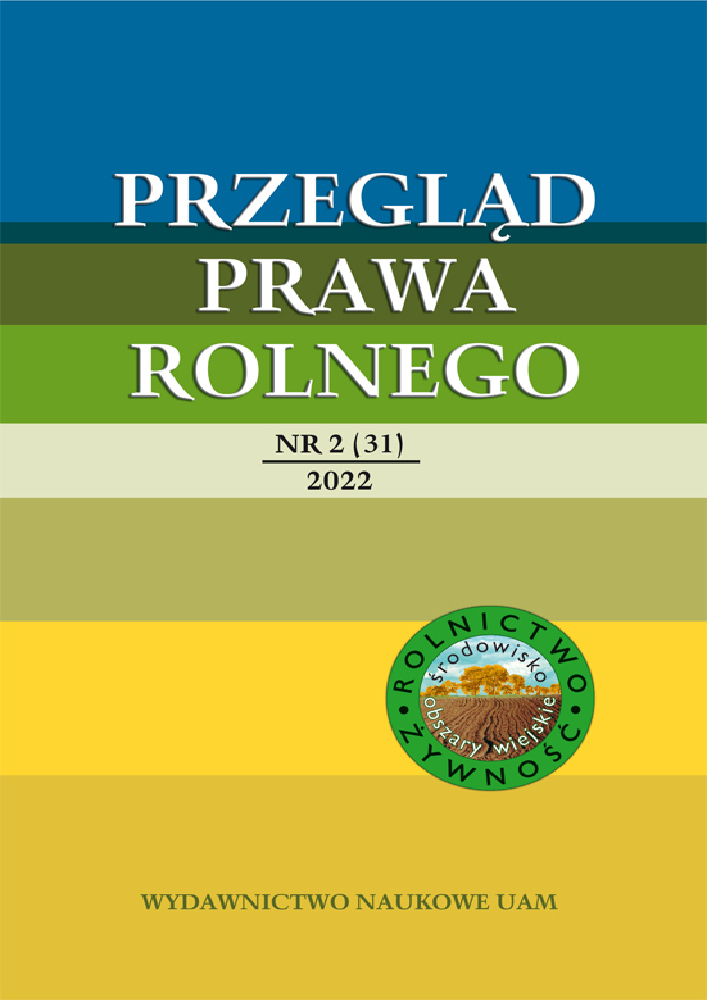Abstract
The purpose of this study was as an assessment of the legal concept of a dietary supplement applicable in European Union law. For this purpose a comparative analysis of the concept of dietary supplements in EU law as well as in the laws of the United States of America, the People’s Republic of China and Australia was carried out. Each of these three latter countries presents a model that differs to a greater or lesser extent from the European model. It has been found out that the principal difficulty in identifying and defining the concept of dietary supplements in the European Union is the lack of a solid scientific basis defining their impact on the human body and the ambiguity of results of clinical studies concerning their use, often based on mere speculation. Hence the postulate to revise the unclear parts of the EU definition of a food supplement and to precise the regulation on its composition.
References
Australian Certified Supplements Standard (2015), https://www.ipaustralia.gov.au/sites/default/files/certification_rules/1836294_170614_initial_rules.pdf [dostęp: 27.09.2022].
Australian Government Department of Health (2018), Australian regulatory guidelines for complementary medicines, https://www.tga.gov.au/sites/default/files/australian-regulatory-guidelines-complementary-medicines-argcm.pdf (dostęp: 27.09.2022).
Australian Government Department of Health, Therapeutic Goods Administration (2016), Medicines and Medical Devices Regulation Review, https://www.tga.gov.au/news/news/australian-government-response-review-medicines-and-medical-devices-regulation [dostęp: 26.09.2022].
Australian Government Department of Health, Therapeutics Goods Administration (2020), Australian Register of Therapeutic Goods, https://www.tga.gov.au/resources/artg (dostęp: 10.10.2022).
Australian Government Department of Health, Therapeutic Goods Administration (2020), How therapeutic goods are regulated in Australia?, https://www.tga.gov.au/how-therapeutic-goods-are-regulated-australia [dostęp: 28.09.2022].
Australian Government Department of Health, Therapeutic Goods Administration (2020), Listed Complementary Medicines, https://www.tga.gov.au/how-we-regulate/supply-therapeutic-good-0/supply-non-prescription-medicine/listed-complementary-medicines [dostęp: 10.10.2022].
Bremmers H., He C., Chinese Approach To Regulating Health Foods, https://edepot.wur.nl/310333 [dostęp: 25.09.2022].
Dwyer J.T., Coates P.M., Smith M.J. (2018), Dietary Supplements: Regulatory Challenges and Research Resources, „Nutrients” nr 10(41).
Hagenmeyer M. (2006), Mad about the Food Supplements, „European Food and Feed Law Review” nr 1.
Jak uregulować rynek suplementów diety i zwiększyć bezpieczeństwo konsumentów?, 2017, http://chpl.com.pl/jak-uregulowac-rynek-suplementow-diety-i-zwiekszyc-bezpieczenstwo-konsumentow,2441,artykul.html [dostęp: 11.09.2022].
Kondrat M. (red.) (2012), Prawo suplementów diety, Warszawa.
Korzycka M., Wojciechowski P. (2017), System prawa żywnościowego, Warszawa.
Leśkiewicz K. (2011), Zakaz wprowadzania w błąd konsumenta w prezentacji suplementów diety (aspekty prawne), „Przegląd Prawa Rolnego” nr 1.
Leśkiewicz K. (2015), Wokół prawnego pojęcia żywności, „Przegląd Prawa Rolnego” nr 1.
McEwen J. (2004), What does TGA approval of medicines mean?, „Australian Prescriber” t. 27, nr 6.
McNamara S.H., Wes Siegner A. Jr (2002), FDA Has Substantial and Sufficient Authority to Regulate Dietary Supplements, „Food and Drug Law Journal” t. 57, nr 1.
National Research Council (2005), Dietary Supplements: A Framework for Evaluating Safety, Washington D.C.
New Dietary Ingredients (NDI) Notification Process, U.S. Food & Drug Admin, https://www.fda.gov/food/dietary-supplements/new-dietary-ingredients-ndi-notification-process [dostęp: 24.09.2022].
Nowak R.E. (2010), DSHEA’s Failure: Why a Proactive Approach do Dietary Supplement Regulation in Needed to Effectively Protect Consumers, „University of Illinois Law Review” nr 1048.
Olszewski W.L., Suplementy – produkty z pogranicza, http://www.kierunekspozywczy.pl/artykul, 3053,suplementy-8211-produkty-z-pogranicza.html [dostęp: 15.09.2022].
Ozimek I., Przeździecka-Czyżewska N. (2015), Reklama suplementów diety, w: M. Królikowska-Olczak, B. Pachuca-Smulska (red.), Ochrona prawna konsumenta na rynku mediów elektronicznych, Warszawa.
Ożóg M. (2010), System handlu produktem leczniczym i produktami pokrewnymi. Problematyka prawna, Warszawa.
Shekelle P.G. i in. (2003), Efficacy and Safety of Ephedra and Ephedrine for Weight Loss and Athletic Performance: A Meta-Analysis, „JAMA” nr 289 (12).
Szymecka-Wesołowska A. (red.) (2013), Bezpieczeństwo żywności i żywienia. Komentarz, Warszawa.
Taczanowski M. (2017), Prawo żywnościowe, Warszawa.
Thakkar S., Anklam E., Xu A. i in. (2020), Regulatory landscape of dietary supplements and herbal medicines from a global perspective, „Regulatory Toxicology Pharmacology” nr 114.
Wojciechowski P. (2010), Introduction of a food supplement into the Polish market, „Rivista di diritto alimentare” nr 1.
World Health Organization (2005), Programme on Traditional Medicine. National policy on traditional medicine and regulation of herbal medicines: report of a WHO global survey, https://apps.who.int/iris/handle/10665/43229 [dostęp: 24.09.2022].
Zayets V. (2019), Comparing Dietary Supplement Regulations in the U.S. and Abroad, „Food and Drug Law Journal” t. 74, nr 4.
Zboralska M. (2011), Swobodny przepływ żywności w postaci suplementów diety w świetle orzecznictwa Trybunału Sprawiedliwości Unii Europejskiej, „Przegląd Prawa Rolnego” nr 2.
License
Copyright (c) 2022 Monika Łata

This work is licensed under a Creative Commons Attribution-ShareAlike 4.0 International License.





